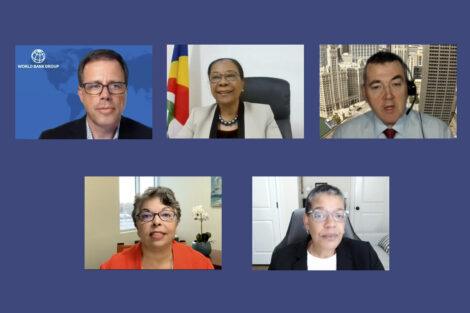At nursing leadership event, speakers cite need for strategic investment in global public health systems and empowering nurses
November 4, 2021—For a stronger global public health system that is better equipped for the next pandemic, we must proactively invest in and empower nurses and nursing leaders, according to Harvard T.H. Chan School of Public Health Dean Michelle Williams.
Providing nurses with strategies, skills and tools to strengthen health systems, manage population health, and reform policies will create a more resilient global public health system in an era that deeply requires it, said Williams in opening remarks at an October 28, 2021 event, “Health Financing in the Time of Pandemics.”
The webinar, sponsored by the Burdett Trust for Nursing and the Gordon and Betty Moore Foundation, featured a keynote address on global health financing by Christoph Kurowski, global lead of health financing at the World Bank Group. It also included a panel on the subject and a discussion of a certificate program launched by the Harvard Global Nursing Leadership Program, which is designed to provide nurses with targeted skills and tools. The program is a joint effort of Harvard Chan School, Harvard Kennedy School, Harvard Graduate School of Education, and the Africa Centres for Disease Control and Prevention (Africa CDC).
“With enough stature, tools, and training, nurses and midwives can and will bring forth transformational improvement in the global health security agenda,” said Williams, citing a need for strategic investment in global health systems that was also recommended in a recent G20 report. She called for leadership training for nurses to enable this pivotal global workforce to develop and implement agile domestic, regional, and global health systems.
During his keynote address, Kurowski described a three-pronged approach to spark global health recovery amid the current pandemic. First, he said, we must roll out vaccines globally to end the pandemic; second, we must strengthen health security to prevent future health crises; and third, we must regain losses in coverage for essential health services not related to the COVID-19 crisis.
Global health recovery, however, is at risk due to widening rifts in health spending, said Kurowski, a reality described by the World Bank Group in its work on the impacts of the COVID-19 crisis. Many countries will struggle to grow their economies and invest in public health as the economic contraction brought on by global pandemic lockdowns in 2020 takes a long-term toll.
While countries can expect, on average, 2.1% growth in their per capita GDP in 2021, it will take several years for most to return to the same rate of economic growth achieved before COVID-19 hit. For a more resilient group of 126 countries, investment in public health is estimated to rise above pre-pandemic levels by 2026, he said. A similar rate of economic recovery is not, however, predicted for 52 countries, which will likely lead to severe estimated cuts in health spending. For full health and economic recovery, he said, the world’s high-income countries must invest in global health and bridge these widening rifts.
For instance, Africa requires robust global funding mechanisms, said Peggy Vidot, minister of health in Seychelles, a small island nation off the east coast of Africa, during a panel discussion moderated by Stephanie Ferguson, visiting fellow in the Department of Health Policy and Management and director of the Harvard Global Nursing Leadership Program.
“We struggled during the pandemic,” said Vidot. Seychelles is dependent on tourism and suffered major financial losses during the pandemic. “It’s important we ensure global health financing, and this is especially true for small island states with many vulnerabilities.”
Meanwhile, the global ranks of nurses require an updated workforce model that enables colleagues worldwide to provide services in new ways to address complex population health challenges, said panelist David Benton, chief executive officer, National Council of State Boards of Nursing. He emphasized the positive health impacts that are possible when nurses have the freedom to work to the full scope of their abilities and practice, which occurred in many countries during the pandemic, for instance, with the expanded use of telemedicine.
The workshop also featured a panel on the launch of a new certificate program offered by the Harvard Global Nursing Leadership Program, including details on the curriculum design. African nurses and midwife leaders were officially invited to apply to the program, which provides leadership skills and applied experience in global public health and population health management. More information about the Harvard Global Public Health for Nurse Leaders Certificate Program, including information about financial assistance, is available, and you can apply here.
